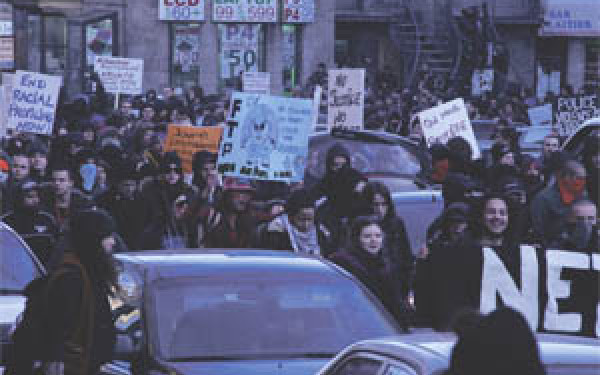Strength in Numbers
Families Affected by Police Violence Take to the Streets
A group of families affected by police violence joined with civil justice advocates and supporters this past weekend to demand an end to police brutality.
The group hosted several events over the weekend in recognition of the North American Day to Stop Police Brutality and Oppression.
Mohamed Bennis, whose son, Anas, was shot and killed by officer Yannick Bernier of the Montreal police in December 2005, called the show of solidarity “a guarantee of the triumph of truth.”
Robyn Maynard, who helped organize the weekend, stressed that the coming together of these families represents a step in the right direction.
“When you have a systematic lack of justice, with people dying at the hands of police, families are made to feel totally isolated,” said Maynard. “It is a powerful act that here, today, people are standing together to support each other.”
A vigil was held outside of the Montreal Police Brotherhood headquarters early Friday evening as the families and their supporters bore the cold weather to tell their stories.
Lilian Villanueva fought back tears as she held a photo of her son Fredy, whose death at the hands of police sparked riots in Montreal North in 2008.
Bridget Tolley, an Algonquin woman whose mother, Gladys, was struck and killed by a Sureté du Québec police squad car in the Kitigan Zibi reserve, condemned the subsequent investigation into her death, which was conducted by the brother of one of the officers implicated in the case.
The Kitigan Zibi police hold jurisdiction in their territories. According to the First Nations Policing agreement, the SQ is not liable for investigations on the reserve. The presence of multiple police agencies and an improperly preserved crime scene has frustrated Tolly’s attempts to investigate her mother’s death.
“Section 9.8 of the [First Nations Policing] agreement is a clause that protects the government of Canada and the government of Quebec from all legal responsibility,” said Tolley. “That means they can come and do whatever they want. And in my mother’s case they struck and killed her and thanks to this agreement they are not liable for their actions.”
The Charest Government recently denied a request for a public inquiry into the death of Gladys Tolley.
Claudio Castagnetta and Quilem Registre both died in police custody after being shot by tasers in 2007. Registre was hit five times during a traffic stop in Montreal. His family released a statement saying that “it is simply inhuman to treat somebody this way. He was not an animal.”
Nearly 300 people marched Saturday to the headquarters of the Service de police de la Ville de Montréal, stopping outside the office of Jean Charest on Sherbrooke Street to voice their demands, which include “the end of racial, social and political profiling and police brutality, the end of police impunity from justice and to stop the use of tasers by police officers.”
Shouts of “Lapointe en prison” came from the crowd, which referred to officer Jean-Loup Lapointe, who fatally shot Fredy Villanueva in 2008.
Francois DuCanel, who helped organize the event, called for an end to what he called police impunity.
“When the cops know they will be accountable for their actions,” he said, “then maybe they will think twice before abusing their power, or at least there will be a way to hold them accountable, so if they do criminal acts, give them a criminal record. […] We want an investigation body that is truly independent that can get to the bottom of police killings.”
Since 1987, 63 people have died at the hands of police officers in Montreal. Of these 63, charges were laid in only two cases—both of which led to the acquittal of the officers involved.
This article originally appeared in Volume 31, Issue 11, published October 26, 2010.

__900_598_90.jpg)
__900_598_90.jpg)
__700_1054_90.jpg)
__700_1054_90.jpg)
__700_1054_90.jpg)
__700_1054_90.jpg)
__900_598_90.jpg)
__700_1054_90.jpg)


_1_600_375_90_s_c1.jpg)
__600_375_90_s_c1.jpg)

2_600_375_90_s_c1.jpg)